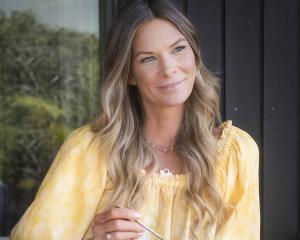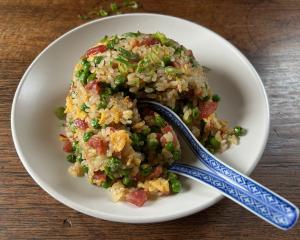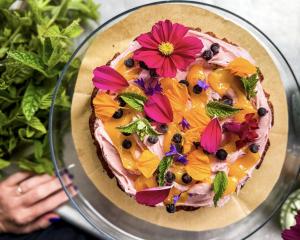Everyone has their own reasons for becoming vegetarian, from being put off by the idea of eating a dead animal or finding meat hard to digest, to health, ethical, environmental, religious and humanitarian issues.
Generally, it's an ethical and compassionate stance that brings people to vegetarianism, but there are also other reasons, says Nicky Owers, spokeswoman for the New Zealand Vegetarian Society.
"People sometimes cut down on meat for their health's sake and then head towards vegetarianism as it becomes more widely known the huge environmental impact farming has as far as resource use, environmental contamination and greenhouse gasses go," she says.
Vegetarians come in many persuasions, too: vegetarians abstain from eating animal flesh, but do eat dairy products and eggs, but some people who call themselves vegetarian will eat fish or even white meat as well; others, known as vegans, eat no animal products, even dairy or eggs, and the strictest vegans will not use leather, either.
It can be a highly personal and individual decision but it's easy to ease into it by eating one or more meals without meat each week, as more people are doing, Mrs Owers says.
Nutrition
A vegetarian diet is one of the healthy eating patterns associated with low risks of cardiovascular disease, type 2 diabetes and some types of cancer, according to Jim Mann, professor in human nutrition and medicine at the University of Otago.
A study he was involved with in the UK in the 1970s showed that vegetarians had lower blood fats and cholesterols and lower rates of heart disease, apparently because of their lower intake of the saturated fat found in meat and dairy, he says.
It appears that the relatively high amounts of nuts, whole grains, unsaturated oils, fruit and vegetables that comprise a good vegetarian diet and the low intakes of animal fat and dietary cholesterol account for the cardio-protection, rather than the avoidance of meat.
"I keep coming back again and again - the justification [for a vegetarian or vegan diet] is ethical and environmental," he says.
A vegan diet can also be healthy, but there is a greater risk of dietary inadequacies than with vegetarianism, particularly a deficiency in vitamin B12, which is mostly found in animal foods such as liver, meat, fish, cheese, milk and eggs, but is also in some fortified vegan products.
"One is slightly nervous about people, like students, who suddenly decide to become vegans and haven't gone into the intricacies of how you get your B12.
The big argument for veganism - and I'm patron of Vega - they do a lot of their justification on ecological grounds rather than push the health thing, which is where it should be."Vegans tend to eat large quantities of nutrient-dense but low-calorie food, and they have some of the lowest rates of obesity of any groups studied in Britain.
They also have low rates of diverticular disease and gallstones, probably because of all the fibre, he says.
However, it's important to be aware of nutritional adequacies if you are weaning or feeding small children on vegetarian or vegan diets, although there are millions of vegetarian and vegan children around the world who are perfectly healthy, he says.
Red meat is often promoted as being high in iron, and it may be the easiest way of ensuring plenty of iron in the diet, but many other foods contain iron, such as spinach, wheat breakfast biscuits, muesli, baked beans, yeast extract, eggs and apricots, although to help the body absorb it vitamin C (found in some of these foods anyway) is needed.
Prof Mann points out that diets change and what people of his generation were brought up on - meat, vegetables, pudding most days and white bread - is completely different from what many people eat now.
He warns that it is possible to have an unhealthy vegetarian diet if you eat too much cheese, other high-fat dairy foods or sweet baked goods, and not enough fruit, vegetables, nuts or whole grains.
A good vegetarian meal doesn't mean taking the meat away and leaving the side vegetables, or necessarily substituting something else, such as "vegetarian sausages", for the meat.
Nor does it mean always eating pasta, filo parcels, quiche or heavy cheese dishes - although these can be vegetarian options.
Whether you are a strict vegetarian or vegan, or just enjoy meatless meals some of the time, vegetarian cooking gives you licence to explore a vast range of exciting dishes from many cultures instead of always thinking of meat and side veges.
It opens a variety of exciting ingredients, too, such as quinoa and other whole grains, lentils, buckwheat, beans, nuts, tofu, and, of course a rainbow cornucopia of vegetables and fruit.
"Contrary to what some people think, we are not limiting what we eat. We eat a bigger range of food," Mrs Owers says.
She believes vegetarian children are exposed to more types of foods than most meat-eating children.
"Ask any parenting expert and they will say just keep at it, just keep offering it to them and say it takes eight to 12 times of offering before they will try it, and I think vegetarian and vegan kids get more exposure anyway.
"Which is contrary to what a lot of people think - that you are cutting out all this - but actually we do eat a bigger range of foods."
Cookbooks
There are numerous cookbooks specially for vegetarians and even vegans, and many regular cookbooks have suitable recipes. Mediterranean and Indian cuisines, in particular, traditionally have numerous meatless recipes.
My favourite vegetarian cookbook is Madhur Jaffrey's World Vegetarian (1999), which has a wealth of enticing recipes from all round the world.
You can look up almost any ingredient in the index and find several different recipes that include it.
Young people especially will find Sam Stern's Eat Vegetarian (Walker, 2010, $30) inspiring and easy to follow.
It's well illustrated and includes "how to" information and lots of simple flavourful recipes such as Turkish pizzas, Mexican salad, polenta, risottos, curries, pies, dumplings and omelettes.
Harvest Vegetarian by Australian chef Adam de Ath (New Holland, 2010, $40) has contemporary, enticingly illustrated recipes such as eggplant roulade, Thai-style tofu salad with fresh soba noodles, or savoury mushroom pancakes that will appeal to both vegetarians and non-vegetarians.
It also includes vegan and gluten-free recipes, but unfortunately is spoilt by having no index, which limits its usefulness.
Vegan cookbooks are less common, although there are many recipes in regular and vegetarian cookbooks that contain no dairy, eggs or other animal products.
With some other recipes, soy or rice milk and margarine can be substituted for milk and butter.
Wild Vegan by Angela Stafford (New Holland, 2010, $35) contains some delicious recipes from around the world, like Moroccan chickpea casserole, Turkish bean soup, tortilla sandwiches, or spicy potato patties.
Again, sadly, its use will be limited by the lack of a good index.
Matching a wine
People often talk about pairing wine with meat (white with white meat, red with red), but what is more important is the flavour and weight of the sauces or other accompaniments, and of course, that goes for matching wine with vegetarian dishes.
Dark and rich flavours, such as mushrooms, tomatoes, eggplant, garlic, strong cheeses, smoky peppers, beans, mild chilli and rich sauces, go best with reds such as shiraz/syrah, merlot, cabernet sauvignon, grenache, tempranillo and darker-flavoured pinot noir.
Lighter flavours, such as nuts, vegetables, light garlic and herbs, breads, light cheeses, egg dishes such as frittata, red pepper, nuts, and salads, go well with lighter pinot noir and whites such as chardonnay, gewurztraminer, sauvignon blanc, pinot gris and riesling.
The two items that can kill a wine are too much vinegar in the salad dressing, and too much chilli.
A vegetarian diet may be one of the healthiest, but other reasons for eating less or abstaining from meat or animal products are becoming increasingly important.
Concern about the environment is a major factor as people become aware of the effect raising animals for meat or dairy products is having on the environment.
Many people now choose to eat one or more meals without meat each week.
A recent UN report, "Assessing the environmental impacts of consumption and production", identifies agriculture, particularly livestock production, as unsustainable as population increases and one of the major drivers of pollution and climate change, on a par with fossil fuel consumption.
"Impacts from agriculture are expected to increase substantially due to population growth increasing consumption of animal products.
Unlike fossil fuels, it is difficult to look for alternatives: people have to eat.
A substantial reduction of impacts would only be possible with a substantial worldwide diet change, away from animal products," the report says.
Grazing occupies 26% of the Earth's land surface, while feed crop production requires about a third of all arable land.
Expansion of grazing land for livestock is a key factor in deforestation, especially in Latin America.
Evidence suggests livestock is the largest sectoral source of water pollutants, principally animal wastes, antibiotics, hormones, chemicals from tanneries, fertilisers and pesticides used for feed crops, and sediments from eroded pastures, according to the report.
It is something many New Zealanders will appreciate as they despair at the increasing pollution of some of our waterways and rivers.
But, besides the environmental aspect, some people become vegetarian or vegan for humanitarian reasons and concern about animal welfare and animal rights.
They may simply not approve of killing animals or, with increasing revelations about the conditions in which animals are raised in factory farms and farming practices such as aborting calves so cows come into milk production sooner, may not wish to support the livestock industry.
As former Beatle Paul McCartney once said: "If slaughterhouses had glass walls, everyone would be a vegetarian".
With the growing awareness of the importance of healthy food, many people are also becoming vegetarian because it matches the kind of low-fat, high-fibre diet recommended by dietitians and doctors.











